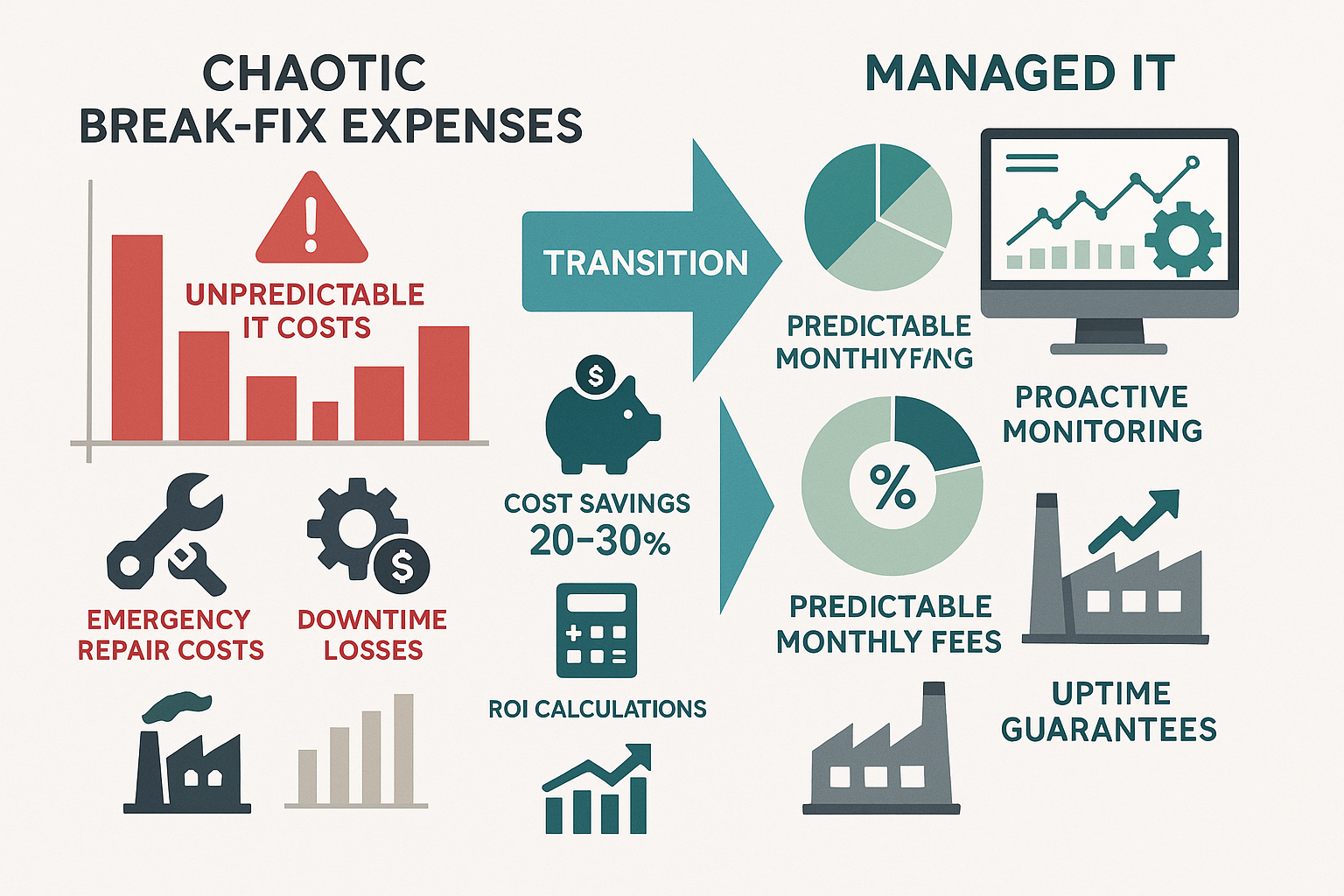Picture this: It’s 3 AM, and your production line just went down. The ERP system crashed, taking your entire manufacturing operation offline. Every minute costs thousands of dollars in lost production, and your internal IT team is scrambling to find a solution. Meanwhile, your CFO is calculating the mounting losses and wondering if there’s a better way to manage technology costs while preventing these disasters. This scenario plays out in manufacturing facilities across the globe, pushing smart Manufacturing CFOs toward managed IT services as a strategic solution for cost control, predictable IT spending, and measurable ROI from managed IT investments.
The manufacturing sector faces unique pressures that make traditional IT approaches increasingly unsustainable. Between razor-thin margins, rising labor costs, and sophisticated cyber-attacks targeting industrial systems, CFO digital transformation has become less of a nice-to-have and more of a survival strategy. Manufacturing IT services delivered through managed service providers (MSPs) offer a compelling answer to these challenges, transforming unpredictable technology expenses into strategic investments that drive measurable business outcomes.
Key Takeaways
• Predictable IT spending through managed services transforms chaotic break-fix costs into fixed monthly OPEX, giving CFOs better financial visibility and forecasting capabilities
• Manufacturing cybersecurity delivered by specialized MSPs provides 24/7 protection against increasingly sophisticated threats targeting industrial systems and factory networks
• Technology ROI in manufacturing improves dramatically when managed IT providers optimize licenses, consolidate tools, and automate manual processes
• IT downtime prevention strategies implemented by MSPs can save millions in lost production time and protect critical manufacturing operations
• Industrial automation IT support enables successful Industry 4.0 initiatives by providing the stable infrastructure needed for IoT, cloud ERP, and smart manufacturing systems
Ready to Take IT Off Your Plate?
Stop worrying about downtime, security risks, or endless IT frustrations. AlphaCIS is the trusted IT partner for small and mid-sized businesses in Metro Atlanta, keeping systems secure, connected, and running the way they should every day.
Whether it’s preventing costly outages, protecting your data, or giving your team unlimited support, we make sure technology helps your business grow instead of holding it back.
📅 Book Your Free ConsultationThe Perfect Storm: Why Manufacturing CFOs Face Unique IT Challenges

Tight Margins Meet Rising Technology Demands
I’ve worked with dozens of manufacturing CFOs over the years, and they all share similar stories. Take Sarah, CFO of a mid-sized automotive parts manufacturer in Ohio. When I first met her in early 2024, she was juggling a $2.3 million IT budget that seemed to evaporate faster than she could track it. “Every month brought another surprise,” she told me. “A server failure here, a security incident there, emergency software licenses we never budgeted for.”
Manufacturing CFO cost control has become exponentially more complex as factories become more digital. The average manufacturing company now relies on:
- ERP systems manage everything from inventory to customer orders
- Industrial control systems running production equipment
- Quality management software ensuring compliance
- Supply chain platforms coordinating with vendors
- Cybersecurity tools protecting against threats
- Cloud solutions for manufacturing, enabling remote access and scalability
Each system requires maintenance, updates, security patches, and occasional emergency repairs. When managed reactively, these costs become unpredictable budget busters.
The Hidden Cost of Downtime
Here’s what keeps manufacturing CFOs awake at night: IT downtime prevention isn’t just about technology; it’s about protecting the entire business model. According to recent industry data, manufacturing downtime costs average $50,000 per hour for mid-sized facilities and can exceed $300,000 per hour for large operations.
Consider these real-world scenarios I’ve witnessed:
Case Study: Automotive Supplier Crisis A Tier 1 automotive supplier experienced a 6-hour ERP system failure during peak production. The result? $480,000 in direct losses, plus penalty fees from OEM customers for missed delivery windows. Their internal IT team took hours to diagnose the issue because they lacked specialized expertise in the manufacturing software stack.
The Ripple Effect When manufacturing IT systems fail, the impact cascades:
- Production lines stop immediately
- Quality control processes halt
- Shipping and receiving freeze
- Customer orders get delayed
- Supplier communications break down
- Compliance reporting becomes impossible
Rising Cybersecurity Threats Target Manufacturing
Manufacturing cybersecurity has become a boardroom priority as attacks on industrial systems surge. The FBI reported a 300% increase in ransomware attacks targeting manufacturing companies between 2022 and 2024. These aren’t just IT inconveniences, they’re existential threats.
Factory network security faces unique vulnerabilities:
- Legacy industrial systems with poor security
- IoT devices with default passwords
- Remote access points for maintenance
- Integration between IT and operational technology (OT)
- Supply chain attack vectors
I recently worked with a food processing company that discovered its production control systems had been compromised for months. The attackers had access to temperature controls, packaging systems, and quality databases. The potential for product contamination, regulatory violations, and brand damage was staggering.
The Budget Forecasting Nightmare
Traditional break-fix IT models make IT budgeting for manufacturers nearly impossible. CFOs need predictable expenses to manage cash flow, secure financing, and plan capital investments. But reactive IT spending creates chaos:
Unpredictable Costs Include:
- Emergency hardware replacements
- After-hours support fees
- Rush shipping for critical components
- Consultant fees for specialized problems
- Software license overages
- Compliance violation penalties
Sarah from our earlier example summed it up perfectly: “I could budget for regular maintenance, but I couldn’t budget for disasters. And in manufacturing, IT disasters happen more often than anyone wants to admit.”
How Managed IT Services Transform Manufacturing Cost Control
From Reactive Chaos to Proactive Strategy
Managed IT services for manufacturing fundamentally change the cost equation. Instead of paying for problems after they occur, manufacturers invest in preventing them. This shift from CAPEX-heavy, reactive spending to predictable IT spending through OPEX models gives CFOs the financial visibility they desperately need.
Here’s how the transformation typically works:
Traditional IT Costs (Reactive Model):
- Hardware failures: $15,000-50,000 per incident
- Emergency support: $200-400 per hour
- Software licensing surprises: $10,000-100,000 annually
- Cybersecurity incidents: $100,000-2,000,000 per breach
- Downtime losses: $50,000+ per hour
Managed IT Model (Proactive Approach):
- Fixed monthly fee: $5,000-25,000 (depending on size)
- Included monitoring and maintenance
- Predictable software licensing
- Proactive cybersecurity protection
- Guaranteed uptime SLAs
Real-World ROI Examples
Let me share some actual results I’ve seen from CFO digital transformation initiatives:
Midwest Steel Fabricator
- Before MSP: $340,000 annual IT costs, 18 hours average downtime monthly
- After MSP: $280,000 annual IT costs, 2 hours average downtime monthly
- Net Savings: $60,000 in direct costs + $800,000 in prevented downtime losses
- Total ROI: 307% in first year
Electronics Assembly Company
- Challenge: The Legacy ERP system is constantly failing, internal IT team is overwhelmed
- Solution: ERP support and optimization through specialized MSP
- Results: 99.8% uptime, 40% faster order processing, and eliminated weekend emergency calls
- Savings: $180,000 annually in prevented downtime and overtime costs
The Power of Predictable Budgeting
IT cost reduction strategies through managed services provide CFOs with something invaluable: predictability. When Sarah’s company switched to a managed IT model, she gained:
Financial Benefits:
- Fixed monthly IT expenses for 12-36 month periods
- Eliminated emergency repair costs
- Reduced insurance premiums through better cybersecurity
- Improved cash flow predictability
- Better ability to secure financing for growth
Operational Benefits:
- 24/7 monitoring and support
- Proactive maintenance prevents failures
- Regular security updates and patches
- Access to specialized manufacturing IT expertise
- Scalable services that grow with the business
Maximizing Technology ROI Through Strategic IT Management

License Optimization: The Hidden Goldmine
One of the fastest ways MSPs for manufacturing companies deliver value is through software license optimization. Most manufacturers are shocked to discover how much they’re overspending on underutilized software.
Common License Waste Areas:
- Microsoft 365: Paying for premium features nobody uses
- ERP systems: Licensing modules that aren’t deployed
- CAD software: Seats assigned to users who switched roles
- Cybersecurity tools: Overlapping solutions providing duplicate protection
- Manufacturing software: Legacy licenses for discontinued systems
Real Example: Automotive Parts Manufacturer During a license audit, we discovered this 200-employee company was paying for:
- 180 Microsoft 365 E5 licenses (only needed 45)
- 25 unused CAD software seats
- Three different backup solutions
- Duplicate cybersecurity tools
Annual savings from optimization: $127,000
Automation: Reducing Manual Processes
Technology ROI in manufacturing skyrockets when MSPs help automate routine processes. Smart manufacturers are using managed IT services to implement:
Production Automation:
- Automated quality control reporting
- Real-time inventory tracking
- Predictive maintenance alerts
- Automated supplier communications
- Digital work order management
Administrative Automation:
- Automated backup and recovery
- Patch management scheduling
- Security monitoring and response
- Performance reporting
- Compliance documentation
Data-Driven Decision Making
Modern manufacturing IT services provide CFOs with unprecedented visibility into operations. When properly implemented, managed IT delivers dashboards showing:
Financial Metrics:
- Real-time production costs
- Equipment utilization rates
- Energy consumption patterns
- Waste reduction opportunities
- Labor efficiency trends
Operational Metrics:
- Machine performance data
- Quality control statistics
- Supply chain bottlenecks
- Customer satisfaction scores
- Delivery performance
This data enables CFOs to make informed decisions about capital investments, process improvements, and strategic initiatives.
Manufacturing Cybersecurity: Protecting Your Greatest Asset
The Escalating Threat Landscape
Manufacturing cybersecurity has evolved from a nice-to-have to a business-critical requirement. The convergence of IT and operational technology (OT) in modern factories creates attack surfaces that internal teams often can’t adequately protect.
Why Manufacturers Are Prime Targets:
- High-value intellectual property (designs, processes, formulas)
- Critical infrastructure that can’t afford downtime
- Often outdated security on industrial systems
- Supply chain connections create multiple entry points
- Willingness to pay ransoms to restore production
Beyond Basic Protection: Comprehensive Security
Factory network security requires specialized expertise that most internal IT teams lack. Effective manufacturing compliance IT must address:
Industrial Control System Security:
- Segmentation between IT and OT networks
- Monitoring of SCADA and HMI systems
- Protection of programmable logic controllers (PLCs)
- Secure remote access for maintenance
- Industrial protocol security
Supply Chain Security:
- Vendor access management
- Secure file sharing protocols
- Third-party risk assessment
- Compliance verification
- Incident response coordination
Compliance and Insurance Requirements
Insurance companies now require minimum cybersecurity standards for manufacturing policies. Manufacturing compliance IT must address frameworks like:
- NIST Cybersecurity Framework
- ISO 27001 for information security
- IEC 62443 for industrial automation security
- CMMC for defense contractors
- Industry-specific regulations (FDA, EPA, etc.)
Managed IT providers specializing in manufacturing understand these requirements and can implement compliant security frameworks more efficiently than internal teams.
24/7 Monitoring and Response
IT infrastructure management for manufacturing requires round-the-clock vigilance. Production doesn’t stop for nights, weekends, or holidays, and neither should security monitoring.
Managed Security Services Include:
- Security Operations Center (SOC) monitoring
- Threat intelligence specific to manufacturing
- Incident response with industrial system expertise
- Vulnerability management for both IT and OT systems
- Compliance reporting and audit support
Supporting Smart Manufacturing and Industry 4.0 Initiatives

The Infrastructure Foundation for Digital Transformation
Industrial automation IT support becomes critical as manufacturers embrace Industry 4.0 technologies. Smart manufacturing initiatives require a robust, reliable IT infrastructure that can handle:
IoT Device Management:
- Thousands of sensors are generating continuous data
- Edge computing for real-time processing
- Secure device provisioning and management
- Data aggregation and analysis
- Predictive maintenance algorithms
Cloud Integration:
- Cloud solutions for manufacturing, enabling scalability
- Hybrid cloud architectures for sensitive data
- Real-time synchronization between systems
- Disaster recovery and business continuity
- Global accessibility for multi-site operations
ERP Modernization and Optimization
ERP support and optimization through managed services helps manufacturers maximize their investment in enterprise software. Modern ERP systems are the backbone of smart manufacturing, integrating:
Core Business Functions:
- Production planning and scheduling
- Inventory and supply chain management
- Quality control and compliance
- Financial reporting and analysis
- Customer relationship management
Advanced Capabilities:
- Real-time production monitoring
- Predictive analytics and forecasting
- Mobile access for floor workers
- Integration with IoT sensors
- Automated reporting and alerts
Enabling Remote Operations
The pandemic accelerated the need for remote manufacturing capabilities. Outsourced IT for manufacturers now includes:
Remote Access Solutions:
- Secure VPN connections for engineering teams
- Cloud-based design and collaboration tools
- Remote monitoring of production systems
- Virtual reality for equipment maintenance
- Digital twin technologies for simulation
Mobile Workforce Support:
- Tablets and smartphones for floor workers
- Real-time communication platforms
- Digital work instructions and procedures
- Mobile quality control applications
- Emergency response coordination
Freeing Internal Teams for High-Value Activities
The Opportunity Cost of DIY IT
When manufacturing companies try to handle IT internally, they often assign these responsibilities to engineers, production managers, or administrative staff. This creates a hidden cost: taking skilled professionals away from their core competencies.
High-Value Activities Internal Teams Should Focus On:
- Production optimization and efficiency improvements
- Quality control and process refinement
- Equipment maintenance and reliability programs
- Supply chain optimization and vendor management
- Customer service and relationship building
- Product development and innovation
Specialized Expertise When You Need It
MSPs for manufacturing companies provide access to specialized skills that would be impossible to maintain internally:
Technical Specializations:
- Industrial network design and implementation
- Manufacturing software integration
- Cybersecurity for operational technology
- Cloud architecture for hybrid environments
- Data analytics and business intelligence
Industry Knowledge:
- Manufacturing compliance requirements
- Industry-specific software platforms
- Best practices for production environments
- Vendor relationships and negotiations
- Emerging technology evaluation
Scalability Without Overhead
As manufacturers grow, their IT needs become more complex. Managed IT services for manufacturing provide scalability without the overhead of hiring, training, and retaining specialized staff.
Scaling Challenges Solved:
- Adding new locations without IT staff
- Implementing new technologies quickly
- Managing increased cybersecurity requirements
- Supporting more complex integrations
- Maintaining compliance across multiple sites
Executive Visibility and Data-Driven Decision Making

Dashboards That Drive Business Decisions
Modern CFOs need real-time visibility into all aspects of their operations. IT infrastructure management through MSPs provides executive dashboards showing:
Financial Performance Metrics:
- Real-time production costs by product line
- Equipment utilization and ROI analysis
- Energy consumption and efficiency trends
- Labor productivity measurements
- Quality costs and waste reduction
Operational Health Indicators:
- System uptime and performance metrics
- Cybersecurity risk scoring and trends
- Compliance status across all systems
- Vendor performance and SLA compliance
- Technology asset lifecycle forecasting
Predictive Analytics for Strategic Planning
Technology ROI in manufacturing improves dramatically when CFOs can predict and plan for technology needs. Managed IT providers offer:
Forecasting Capabilities:
- Equipment replacement planning
- Software upgrade scheduling
- Capacity planning for growth
- Budget forecasting for technology investments
- Risk assessment and mitigation planning
Strategic Insights:
- Benchmarking against industry standards
- Technology trend analysis and recommendations
- ROI projections for new initiatives
- Cost-benefit analysis for automation projects
- Digital transformation roadmapping
Compliance Reporting and Audit Support
Manufacturing compliance IT generates extensive documentation requirements. MSPs help CFOs maintain compliance through:
Automated Reporting:
- Security incident documentation
- System performance reports
- Compliance checklist verification
- Audit trail maintenance
- Risk assessment updates
Audit Preparation:
- Documentation organization
- Evidence collection and preservation
- Expert testimony and support
- Remediation planning
- Continuous improvement recommendations
Making the Business Case for Managed IT Services
Building Your ROI Calculation
When presenting IT cost reduction strategies to leadership, CFOs need comprehensive ROI calculations that account for both direct savings and opportunity costs.
Direct Cost Savings:
- Reduced emergency repair expenses
- Lower software licensing costs
- Eliminated overtime for IT issues
- Reduced insurance premiums
- Prevented downtime losses
Indirect Benefits:
- Improved employee productivity
- Better customer satisfaction
- Enhanced competitive positioning
- Reduced regulatory risk
- Accelerated innovation capabilities
Implementation Timeline and Expectations
CFO digital transformation through managed IT services typically follows this timeline:
Month 1-2: Assessment and Planning
- Current state analysis
- Gap identification
- Solution design
- Contract negotiation
- Implementation planning
Month 3-6: Initial Implementation
- Core system monitoring setup
- Security baseline establishment
- Process documentation
- Staff training
- Emergency response testing
Months 7-12: Optimization and Expansion
- Performance tuning
- Additional service integration
- Automation implementation
- ROI measurement and reporting
- Strategic planning for year two
Measuring Success
ROI from managed IT should be measured across multiple dimensions:
Financial Metrics:
- Total cost of ownership reduction
- Downtime cost avoidance
- Productivity improvements
- Compliance cost reduction
- Risk mitigation value
Operational Metrics:
- System uptime improvements
- Response time reductions
- Security incident prevention
- Process automation achievements
- Customer satisfaction increases
🏭 Manufacturing IT ROI Calculator
Ready to Take IT Off Your Plate?
Stop worrying about downtime, security risks, or endless IT frustrations. AlphaCIS is the trusted IT partner for small and mid-sized businesses in Metro Atlanta, keeping systems secure, connected, and running the way they should every day.
Whether it’s preventing costly outages, protecting your data, or giving your team unlimited support, we make sure technology helps your business grow instead of holding it back.
📅 Book Your Free ConsultationConclusion: The Strategic Imperative for Manufacturing IT Transformation
The evidence is overwhelming: manufacturing CFOs who embrace managed IT services are positioning their companies for sustained competitive advantage in 2025 and beyond. This isn’t just about cutting costs; it’s about transforming technology from a necessary expense into a strategic asset that drives measurable business outcomes.
The manufacturers thriving in today’s challenging environment share common characteristics. They’ve moved beyond reactive IT management to embrace predictable IT spending models that provide financial visibility and operational reliability. They’ve recognized that manufacturing cybersecurity requires specialized expertise that internal teams simply cannot match. Most importantly, they’ve discovered that the ROI from managed IT extends far beyond direct cost savings to include productivity gains, risk mitigation, and competitive advantages.
Your Next Steps: Building the Business Case
If you’re ready to explore managed IT services for manufacturing, here’s your action plan:
1. Conduct a Total Cost Analysis. Document your current IT spending, including hidden costs like downtime, emergency repairs, and opportunity costs of internal staff managing technology instead of focusing on core manufacturing activities.
2. Assess Your Risk Exposure: Evaluate your cybersecurity posture, compliance requirements, and potential financial impact of system failures. Consider how current threats to factory network security could impact your operations.
3. Define Your Digital Transformation Goals. Identify specific outcomes you want to achieve: reduced downtime, improved productivity, better compliance, or support for industrial automation IT initiatives.
4. Research Specialized MSPs. Look for MSPs for manufacturing companies with proven experience in your industry. Verify their expertise in manufacturing compliance IT, ERP support and optimization, and IT downtime prevention.
5. Start with a Pilot Program. Consider beginning with a specific area like cybersecurity monitoring or ERP support to demonstrate value before expanding to comprehensive IT infrastructure management.
The Future of Manufacturing IT
As we look ahead, the manufacturers who will thrive are those embracing technology ROI in manufacturing as a core business strategy. The convergence of IoT, artificial intelligence, and cloud computing is creating unprecedented opportunities for operational efficiency and competitive advantage.
Managed IT services for manufacturing provide the foundation for this digital future. By partnering with specialized providers, CFOs can ensure their companies have the technological infrastructure, security posture, and strategic expertise needed to capitalize on emerging opportunities while protecting against evolving risks.
The question isn’t whether to embrace managed IT services; it’s how quickly you can implement them to start realizing the benefits. In a manufacturing environment where every hour of downtime costs thousands of dollars, and cyber threats grow more sophisticated daily, the cost of inaction far exceeds the investment in professional IT management.
Your competitors are already making this transition. The CFOs who act decisively today will be the ones celebrating measurable ROI, improved operational efficiency, and strategic competitive advantages tomorrow. The time for CFO digital transformation through managed IT services is now.
Ready to Take IT Off Your Plate?
Stop worrying about downtime, security risks, or endless IT frustrations. AlphaCIS is the trusted IT partner for small and mid-sized businesses in Metro Atlanta, keeping systems secure, connected, and running the way they should every day.
Whether it’s preventing costly outages, protecting your data, or giving your team unlimited support, we make sure technology helps your business grow instead of holding it back.
📅 Book Your Free Consultation
Dmitriy Teplinskiy
I have worked in the IT industry for 15+ years. During this time I have consulted clients in accounting and finance, manufacturing, automotive and boating, retail and everything in between. My background is in Networking and Cybersecurity



